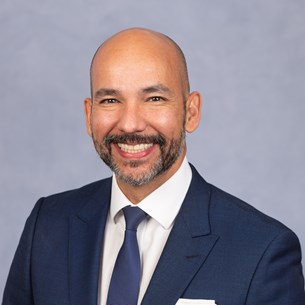Meeting
2023 ASCO Annual Meeting

Sylvester Comprehensive Cancer Center, University of Miami, Miami, FL
Gilberto Lopes , Bethany Delcuze , Ilona Dewald , Kelly E. McKinnon , Jeffrey D. Carter , Cherilyn Heggen
Background: A growing number of targeted therapy approvals for mNSCLC have dramatically increased requirements for molecular testing. Identifying and addressing real-world challenges mNSCLC care teams face due to resulting workflow shifts is essential to optimize patient outcomes. Methods: In March–September 2022, 126 health care professionals (HCPs) who treat NSCLC at 10 US community oncology clinics completed surveys assessing practice patterns, challenges, and confidence related to biomarker testing and targeted therapy use. HCPs (N = 105) participated in interdisciplinary audit and feedback (AF) sessions to examine clinical evidence and develop clinic-specific action plans to address identified gaps. Results: Participants represented the interprofessional NSCLC care team: medical oncologists (32%), pathologists (1%), radiation oncologists (1%), pulmonologists (2%), PCP/other physicians (5%), advanced practice professionals (22%), nurses (19%), and other HCPs (e.g. patient navigator, practice manager; [19%]). At the time of the program there were 9 NCCN-recommended biomarkers for mNSCLC. Less than half of HCPs reported regular testing for 4 of these biomarkers (Table 1). The majority of HCPs were somewhat (52%) or very/extremely (23%) likely to start treatment prior to receiving molecular testing results. Top reported barriers to integrating molecular diagnostics into routine practice were biopsy tissue availability/quality (45%) and determining whether to begin treatment prior to receipt of molecular testing results (43%). Gap-oriented clinic action plans aimed to improve communication between oncologists, pulmonologists, and pathologists to increase quality and efficiency of testing. A targeted therapy toolkit was developed with a panel of oncology and pathology experts and distributed to participants to address gaps in knowledge of testing practices and guidelines. HCP confidence in biomarker testing increased from 72% to 92% following the intervention. More HCPs correctly answered knowledge (43% pre-AF vs 61% post-AF) and competence (29% pre-AF vs 54% post-AF) questions following participation in the AF sessions. Conclusions: While molecular testing is critical for mNSCLC care, HCPs report sub-optimal rates of conducting testing prior to treatment and incorporating results into treatment planning. Here, we highlight an unmet need for improved interdisciplinary communication and coordination in mNSCLC care teams and an educational intervention strategy that can be used to improve HCP biomarker and targeted therapy use in mNSCLC.
| Biomarker | HCPs reporting regular testing (N = 126) |
|---|---|
| EGFR | 83% |
| PD-L1 | 79% |
| ALK rearrangement | 68% |
| KRAS G12C | 63% |
| BRAF V600E | 60% |
| ROS1 rearrangement | 46% |
| METex14 skipping | 44% |
| RET rearrangement | 41% |
| NTRK fusion | 38% |
Disclaimer
This material on this page is ©2024 American Society of Clinical Oncology, all rights reserved. Licensing available upon request. For more information, please contact licensing@asco.org
2023 ASCO Annual Meeting
Publication Only
Publication Only: Lung Cancer—Non-Small Cell Metastatic
Lung Cancer
Metastatic Non–Small Cell Lung Cancer
J Clin Oncol 41, 2023 (suppl 16; abstr e21191)
10.1200/JCO.2023.41.16_suppl.e21191
e21191
Abstract Disclosures
2023 ASCO Annual Meeting
First Author: Anne Jacobson
2023 ASCO Quality Care Symposium
First Author: Nisha Anjali Mohindra
2023 ASCO Annual Meeting
First Author: Thomas Stricker
2023 ASCO Annual Meeting
First Author: Mo Yang